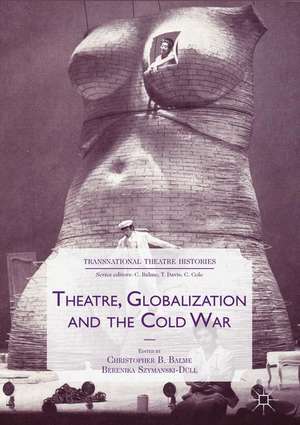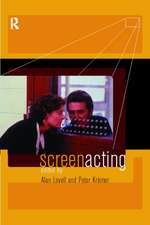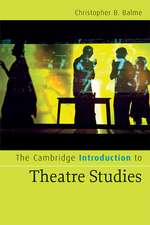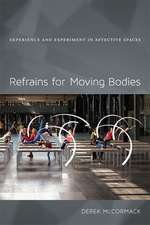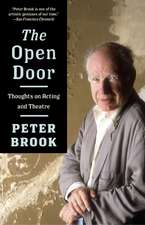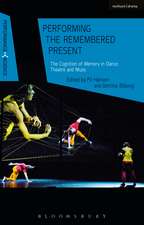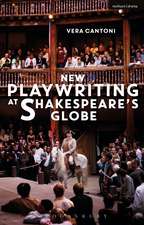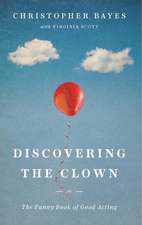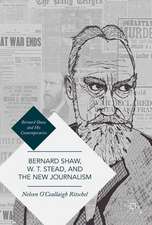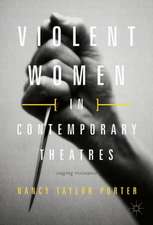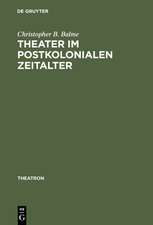Theatre, Globalization and the Cold War: Transnational Theatre Histories
Editat de Christopher B. Balme, Berenika Szymanski-Düllen Limba Engleză Hardback – 13 iun 2017
| Toate formatele și edițiile | Preț | Express |
|---|---|---|
| Paperback (1) | 528.30 lei 6-8 săpt. | |
| Springer International Publishing – 12 aug 2018 | 528.30 lei 6-8 săpt. | |
| Hardback (1) | 703.06 lei 6-8 săpt. | |
| Springer International Publishing – 13 iun 2017 | 703.06 lei 6-8 săpt. |
Preț: 703.06 lei
Preț vechi: 827.13 lei
-15% Nou
Puncte Express: 1055
Preț estimativ în valută:
134.55€ • 146.10$ • 113.02£
134.55€ • 146.10$ • 113.02£
Carte tipărită la comandă
Livrare economică 22 aprilie-06 mai
Preluare comenzi: 021 569.72.76
Specificații
ISBN-13: 9783319480831
ISBN-10: 3319480839
Pagini: 350
Ilustrații: XV, 350 p. 4 illus.
Dimensiuni: 148 x 210 x 27 mm
Greutate: 0.59 kg
Ediția:1st ed. 2017
Editura: Springer International Publishing
Colecția Palgrave Macmillan
Seria Transnational Theatre Histories
Locul publicării:Cham, Switzerland
ISBN-10: 3319480839
Pagini: 350
Ilustrații: XV, 350 p. 4 illus.
Dimensiuni: 148 x 210 x 27 mm
Greutate: 0.59 kg
Ediția:1st ed. 2017
Editura: Springer International Publishing
Colecția Palgrave Macmillan
Seria Transnational Theatre Histories
Locul publicării:Cham, Switzerland
Cuprins
Introduction; Christopher B. Balme and Berenika Szymanski-Düll.- Part I: Shifting Borders.- 1. A Cold War Battleground ; Charlotte M. Canning.- 2. Spirituals, Serfs, and Soviets; Christopher Silsby.- 3. The Politics of an International Reputation; David Barnett.- 4. ‘A tour to the West could bring a lot of trouble...’; Berenika Szymanski-Düll.- 5. Song and Dance Ensembles in Central European Militaries; Václav Šmidrkal.- 6. Theatre, Propaganda and the Cold War; Zoltán Imre.- Part II: Institutions and Institutional Imbrications.- 7. MI5 Surveillance of British Cold War Theatre; James Smith.- 8. Creating an International Community during the Cold War; Hanna Korsberg.- 9. The Cultural Cold War on the Home Front; Kyrill Kunakhovich.- Part III: Acting, Artists and Art Between the Battlefronts.- 10. Years of Compromise and Political Servility; Karolina Prykowska Michalak.- 11. ‘A Memorable French-Romanian Evening’; Ioana Szeman.- 12. An Eastern Bloc Cultural Figure?; Nikolaos Papadogiannis.- 13. Acting on the Cold War; Anja Klöck.- 14. Checkpoint Music Drama; Sebastian Stauss.- Part IV: Postcolonial Perspectives.- 15. Whose Side Are You On?; Christine Matzke .- 16. ‘How close is Angola to us?’; Rikard Hoogland.- 17. Manila and the World Dance Space; meLê Yamomo and Basilio E. Villaruz.- Bilbiography.- Index.
Notă biografică
Christopher Balme holds the Chair in Theatre Studies at the Ludwig Maximilian University of Munich, Germany. His current research interests focus on the legacy of modernism in the globalization of the arts; theatre and the public sphere; and the relationship between media and performance. He is director of the Global Theatre Histories project.
Berenika Szymanski-Düll is Lecturer in Theatre Studies at the Ludwig Maximilian University of Munich, Germany. Her current research interests include international touring theatre in the 19th century, theatre and migration and Performance Art in Eastern Europe during the Cold War. She is an associate of the Global Theatre Histories research project.
Berenika Szymanski-Düll is Lecturer in Theatre Studies at the Ludwig Maximilian University of Munich, Germany. Her current research interests include international touring theatre in the 19th century, theatre and migration and Performance Art in Eastern Europe during the Cold War. She is an associate of the Global Theatre Histories research project.
Textul de pe ultima copertă
This book examines how the Cold War had a far-reaching impact on theatre by presenting a range of current scholarship on the topic from scholars from a dozen countries. They represent in turn a variety of perspectives, methodologies and theatrical genres, including not only Bertolt Brecht, Jerzy Grotowski and Peter Brook, but also Polish folk-dancing, documentary theatre and opera production. The contributions demonstrate that there was much more at stake and a much larger investment of ideological and economic capital than a simple dichotomy between East versus West or socialism versus capitalism might suggest. Culture, and theatrical culture in particular with its high degree of representational power, was recognized as an important medium in the ideological struggles that characterize this epoch. Most importantly, the volume explores how theatre can be reconceptualized in terms of transnational or even global processes which, it will be argued, were an integral part of Cold War rivalries.
Caracteristici
Offers a multi-faceted new way of understanding Cold War theatre through a transnational lens Takes a multi-disciplinary approach to analysing international relations during the Cold War Draws on exclusive archival sources to further investigate this fascinating topic
